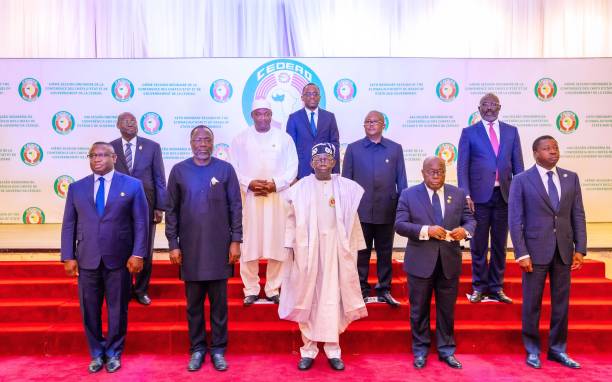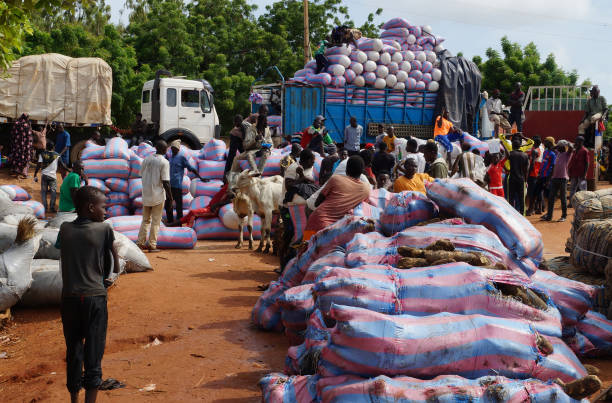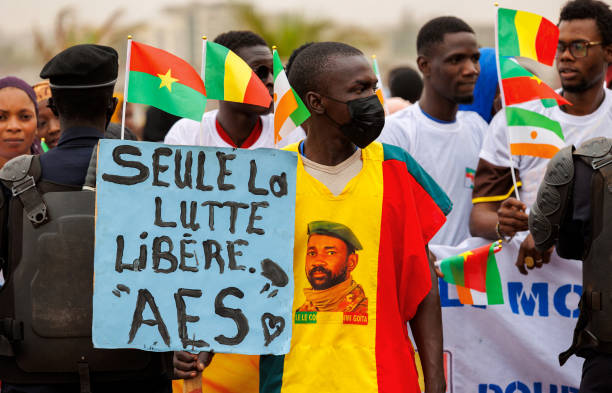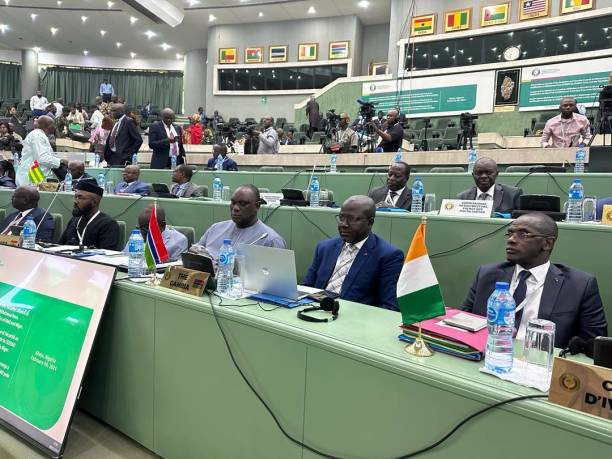ECOWAS: Four Years of Progress in Peace, Security, and Development
The Economic Community of West African States (ECOWAS) has made significant strides in promoting peace, security, and socio-economic development in the region over the last four years. Through various initiatives and programs, ECOWAS has strengthened its peace and security architecture, promoted regional integration and trade with the goal improving the living standards for its citizens. This report by E. R. Umukoro for LightRay! Media highlights ECOWAS’ key achievements and initiatives in areas such as peace and security, regional integration, agriculture, telecommunications, youth, and gender development, showcasing the Community’s commitment to a more stable and prosperous West Africa.
This report also identifies some the challenges ECOWAS needs to overcome for the region to emerge a regional block of economic advancement and political stature amongst the committee of nations.
ECOWAS has made significant strides in promoting peace, security, and socio-economic development in West Africa over the last four years. An analysis of these key thematic focus highlights areas of commendable achievements.
Peace and Security Initiatives
ECOWAS has strengthened its peace and security architecture through the Support to the ECOWAS Peace and Security Architecture and Operations (EPSAO) project. This project aimed to prevent and manage conflicts, and it enhanced cooperation between ECOWAS institutions, member states, and civil society organizations.
For instance, in 2020, ECOWAS deployed a fact-finding mission to Mali to assess the security situation and provide recommendations for stabilizing the country. This effort helped to reduce tensions and paved the way for a peaceful resolution.
“The EPSAO project has been instrumental in enhancing our capacity to respond to security challenges in the region,” said Dr. Abdel-Fatau Musah, ECOWAS Commissioner for Political Affairs, Peace and Security. “We are committed to continuing our efforts to promote peace and stability in West Africa.”

Socio-Economic Development
In the area of socio-economic development, ECOWAS has implemented various initiatives to promote regional integration, trade, and economic growth. The Support Programme for the ECOWAS Commission, for example, strengthened the Commission’s capacity to design, coordinate, and monitor regional integration processes.
ECOWAS has also promoted intra-regional trade through the ECOWAS Trade Liberalisation Scheme (ETLS). Since its inception in 1979, the ETLS has increased trade among member states, with intra-regional trade rising from 3.5% in 1979 to 12.5% in 2020.
“The ETLS has been a game-changer for our region,” said Mrs. Finda Koroma, Vice President of the ECOWAS Commission. “It has helped to increase trade, economic growth, and job creation, and we are committed to continuing to support this initiative.”
Regional Integration, Transport, and Energy
ECOWAS has made progress in promoting regional integration, transport, and energy cooperation. The Community has established institutions and programs to facilitate the free movement of persons, goods, and services.
For example, the ECOWAS Brown Card Scheme, which was launched in 1982, provides insurance coverage for vehicles traveling across member states. This scheme has facilitated the movement of goods and people, and it has contributed to the growth of regional trade.

ECOWAS has also invested in transport infrastructure development, including roads, ports, and railways. The Community has implemented several projects to improve the region’s transport network, including the ECOWAS Road Development Project, which aims to improve road connectivity and facilitate trade.
“The development of our transport infrastructure is critical to promoting regional integration and economic growth,” said Mr. Ebrima Njie, ECOWAS Commissioner for Infrastructure. “We are committed to continuing our efforts to improve our transport network and facilitate the movement of goods and people.”
Agriculture, Telecommunications, Youth, and Gender
In agriculture, ECOWAS has implemented initiatives to promote regional food security and sustainable agricultural practices. The Community has established programs to support farmers, improve agricultural productivity, and enhance food security.
For example, the ECOWAS Agricultural Policy (ECOWAP) aims to promote regional food security and sustainable agricultural development. The policy provides a framework for coordinating agricultural development efforts across member states.

ECOWAS has also promoted telecommunications development, including the establishment of a regional telecommunications regulatory framework. The Community has implemented initiatives to improve access to telecommunications services, including the development of a regional broadband infrastructure.
“The development of our telecommunications sector is critical to promoting economic growth and regional integration,” said Mr. Sekou Diallo, ECOWAS Commissioner for Telecommunications. “We are committed to continuing our efforts to improve access to telecommunications services and promote regional integration.”
ECOWAS has prioritized youth and gender issues, including the promotion of women’s participation in peace and security processes. The Community has established programs to support youth development and empowerment, including the ECOWAS Youth and Sports Development Centre.
“The empowerment of our youth and women is critical to promoting regional development and stability,” said Dr. Siga Fatima Jagne, ECOWAS Commissioner for Social Affairs and Gender. “We are committed to continuing our efforts to support youth and women’s empowerment and promote regional development.”

Despite its achievements, ECOWAS has faced several challenges in the last four years that it needs to overcome. Some of these challenges include:
Security Challenges
- Terrorism and Insurgency: The rise of terrorist groups such as Boko Haram in the Sahel region has posed a significant threat to regional security.
- Piracy and Maritime Insecurity: The Gulf of Guinea has seen an increase in piracy and maritime insecurity, affecting regional trade and economic development.
- Transnational Organized Crime: ECOWAS has struggled to combat transnational organized crime, including human trafficking, drug trafficking, and arms smuggling.
Economic Challenges
- Economic Diversification: ECOWAS member states have struggled to diversify their economies, leading to a reliance on primary commodities and vulnerability to global market fluctuations.
- Infrastructure Development: The region faces significant infrastructure challenges, including inadequate roads, ports, and energy systems.
- Regional Trade: Despite efforts to promote regional trade, ECOWAS member states have struggled to increase trade among themselves, with many countries still relying heavily on external trade partners.
Institutional Challenges
- Institutional Capacity: ECOWAS institutions have faced capacity challenges, including inadequate staffing, funding, and resources.
- Decision-Making: The organization has struggled with decision-making, with some member states occasionally disagreeing on key issues.
- Implementation: ECOWAS has faced challenges in implementing its decisions and programs, often due to inadequate resources and capacity.

Social Challenges
- Youth Unemployment: The region faces significant youth unemployment challenges, with many young people struggling to find employment.
- Migration: ECOWAS has struggled to address migration challenges, including irregular migration and brain drain.
- Healthcare: The region faces significant healthcare challenges, including inadequate access to healthcare services and the prevalence of infectious diseases.
Environmental Challenges:
- Climate Change: ECOWAS member states are vulnerable to climate change, with many countries experiencing droughts, floods, and other extreme weather events.
- Environmental Degradation: The region faces significant environmental degradation challenges, including deforestation, desertification, and pollution.
- Natural Resource Management: ECOWAS has struggled to promote sustainable natural resource management, including the management of water, land, and minerals.
By addressing these challenges, ECOWAS can overcome its current obstacles and continue to promote peace, security, and socio-economic development in West Africa.
In conclusion, ECOWAS has made significant progress in promoting peace, security, and socio-economic development in West Africa over the last four years. The Community’s initiatives have contributed to regional stability, economic growth, and improved living standards. While challenges persist, ECOWAS remains committed to continuing its efforts to promote regional development and stability.





Comments